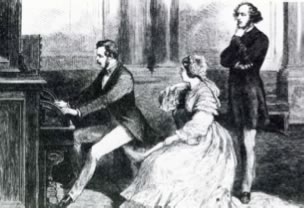 |
| Chopin Portrait by Maria Wodzińska 1836 |
Chopin with Andras Schiff 1999 production: Classical Tv Entire Video [high quality] : or on Youtube: Part 1 Part 2 Part 3 Part 4 Part 5 Part 6. It's not the first time the two had collaborated, previously in 1997 they produced the Wanderer for BBC Omnibus about the life of Franz Schubert. Below is a summary of the ideas Schiff presents about Chopin, his life, composition characteristics, musical influences, and legacy.
Characterising Chopin's Music
Chopin grew up in the Polish countryside, and the folk music such as mazurkas influenced his composition, it's considered by Schiff as the most Polish utterances (characteristic). It was his favourite genre of music, and kept his connection, adds Schiff to his country through polonaises and mazurkas.
Asked how he would describe his music, it always contains an element a Polish word 'zal' which means it contains an element of the polish word: sadness, nostalgia, sorrow, regret, melancholia, up to a degree of fury and anger. Schiff says it is with his music he could open up and pour out his soul.
Chopin's musical upbringing and education
Born in 1810, Chopin grew up in Warsaw, Poland at the time when was under Russian rule.
Chopin's both parents were musical. Chopin's father, a teacher, played the flute and violin, his mother sang
and played the piano. Chopin picked up a lot from this experience, by listening and singing along.
It is interesteresting to note, adds Schiff that, Chopin never really had piano lessons. [Although, wikipedia indicates Zywny was chopin's first piano teacher] His first teacher, Czech Wojciech Zywny, a violinist and composer, taught Chopin love and respect of the music of Bach and Mozart, whom he regarded as having the best taste. Chopin's 24 preludes and fugues, in fact are directly inspired from Bach's - which are regarded as essential technique, which the impressario Hans Von Bulow called the "Old Testament of the Piano".
By age 18,19 Chopin was firmly established in the musical society of Poland, he had written his both two Piano Concertos, and established as a national celebrity. He had even performed for the Tsar of Russia. It was recognised he needed to seek wider opportunities within Europe so he had to 'cut the umbilical cord' of his fatherland. In, november 1830, age 20, he left Warsaw for Vienna, a very important and vital step for Chopin. He never returned to Poland. On Chopin's wish, after he died, his heart was taken back to his native Poland.
September 1831 was when Chopin arrived in Paris, Schiff notes that this was a great time, with a new bourgeoisie class emerging, with a love of literature, architecture and the arts, and a good family would own a piano. So Chopin provided piano lessons to these families and attended these families' frequent soirees (small intimate circles of friends) improvising and playing till 5 or 6 in the morning. Attendees could immerse themselves in Chopin's music forgetting all their troubles and miseries. Chopin disliked performing for large audiences, but had to in order to further his reputation. His concerts at the Paris Conservatoire, became legendary events.
Capturing Revolutionary Spirit
Europe was in turmoil politically and economically, following the Napoleonic wars at this time. On the way to Paris, he heard that the latest Polish uprising against Russian occupation had been crushed, which Chopin reflects in his Revolutionary Etude in C# minor, written at this time, which Schiff believes is the most tragic and dramatic in Chopin's music. In his diary, he writes of his despair fearing that his friends and family are raped and executed.
Chopin's pianistic innovations
After Chopin you couldn't write piano music the same way again, he has revolutionised and changed the sound and concept and approach to the piano.He has innovated piano technique, such as, in fingering, using the thumb on the black keys, which was previously forbidden. Chopin's fingering allows more of a liberty of playing on the keyboard. Schiff displaying a plastercast of Chopin's left hand, describing it as elegant and aristocratic. Chopin had an enormous stretch in his hands and great suppleness. Chopin was the first to say the hand has a natural position on the keyboard, each finger has a distinct character and personality, and therefore should not be similar to each other. Chopin recognised that that 4th finger is a weak one (he called his 3rd finger a long nose and the 4th a disobedient one). So Chopin wrote to the requirements of the hand, which Schiff demonstrates with the Etude in Ab. Chopin's idea of virtuosity, the cultivation of the beauty of sound. Schumann and Mendelssohn revered Chopin's music, however Chopin was not as recipricol in his admiration, not even opening Schumann's Kreisleriana, which was dedicated to him for months.
Chopin's legacy
Chopin was one of the greatest composers ever,on the highest level as Bach, Beethoven, Mozart, and Schubert. He has been portrayed as a wild flamboyant romantic, physically weak and fragile, dying of consumption; a very sentimental image; [however] there is no element of sentimentality in his music.
One of the great Chopin interpreters and womaniser adds Schiff, Artur Rubinstein said that Chopin's music was the greatest seducer.
Further Reading
- Chopin's 'Soul and Heart', Byron Janis, Wall Street Journal, 2010




